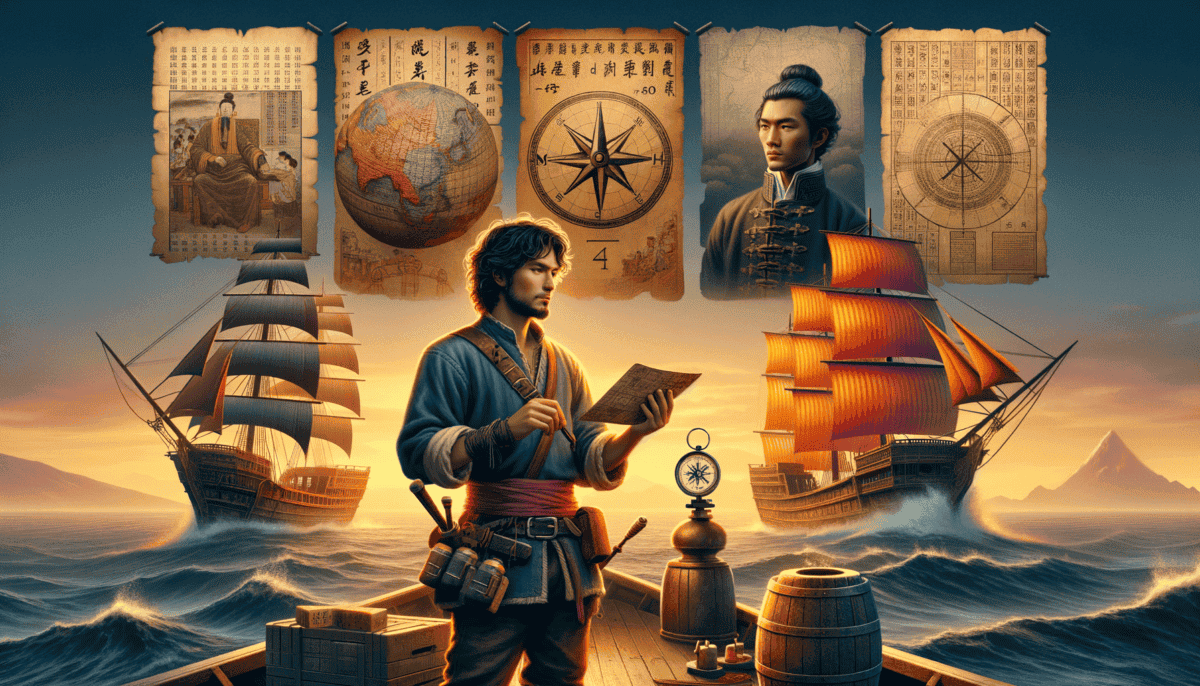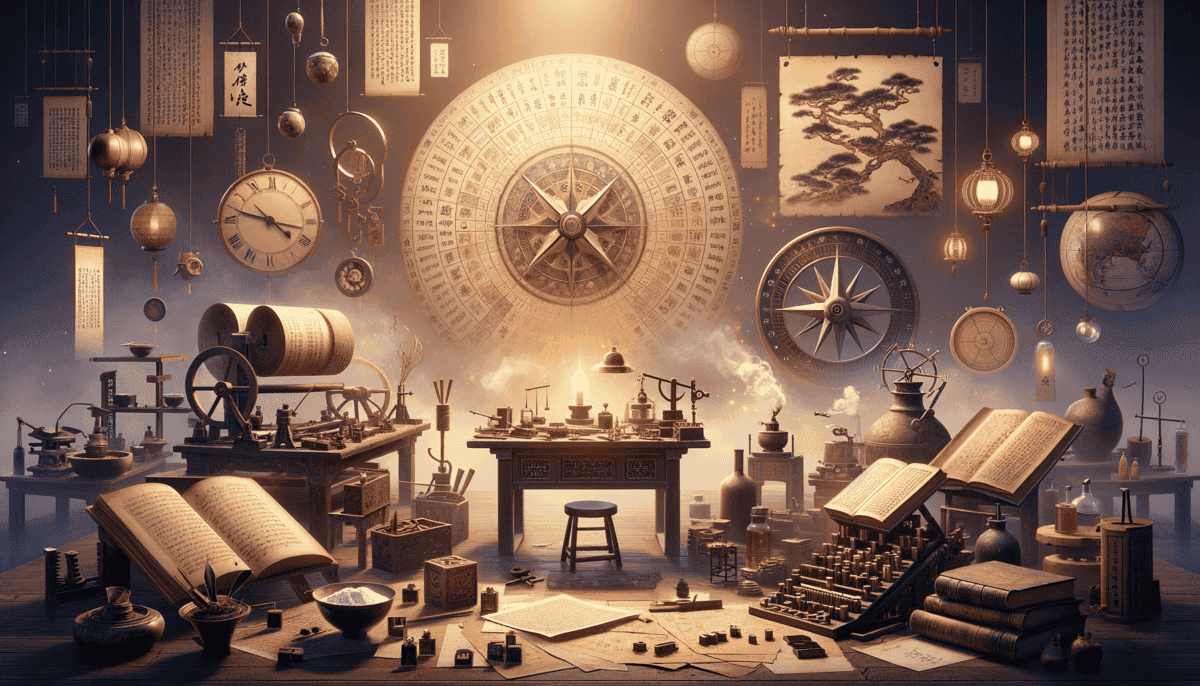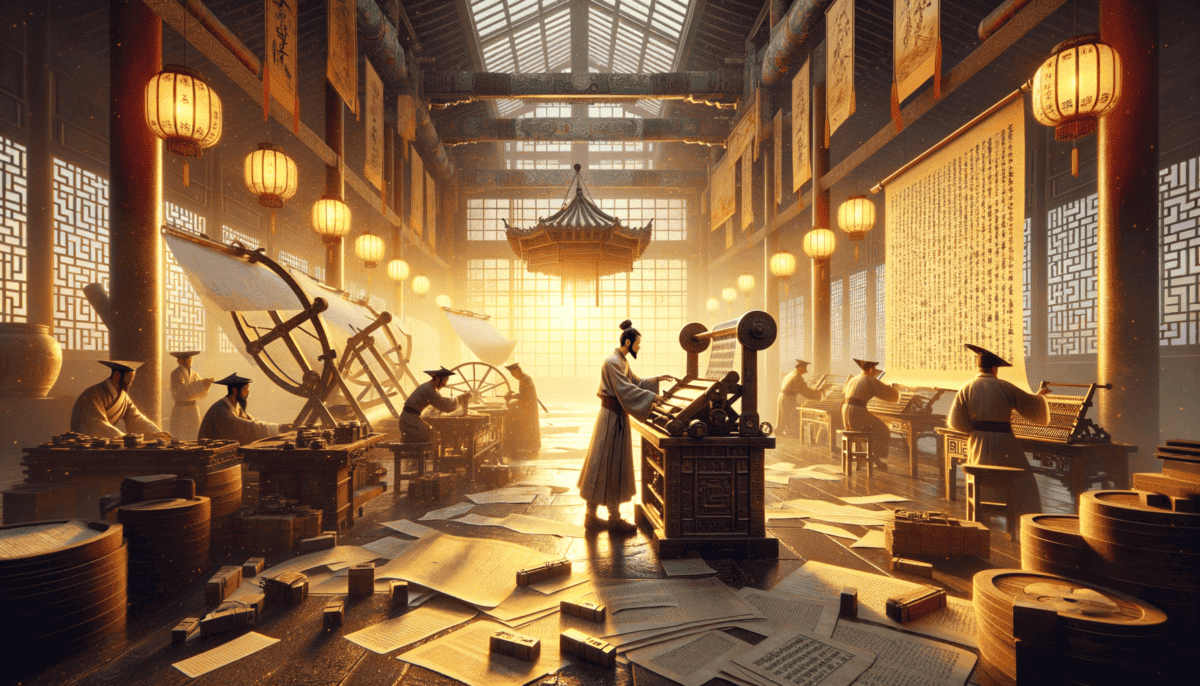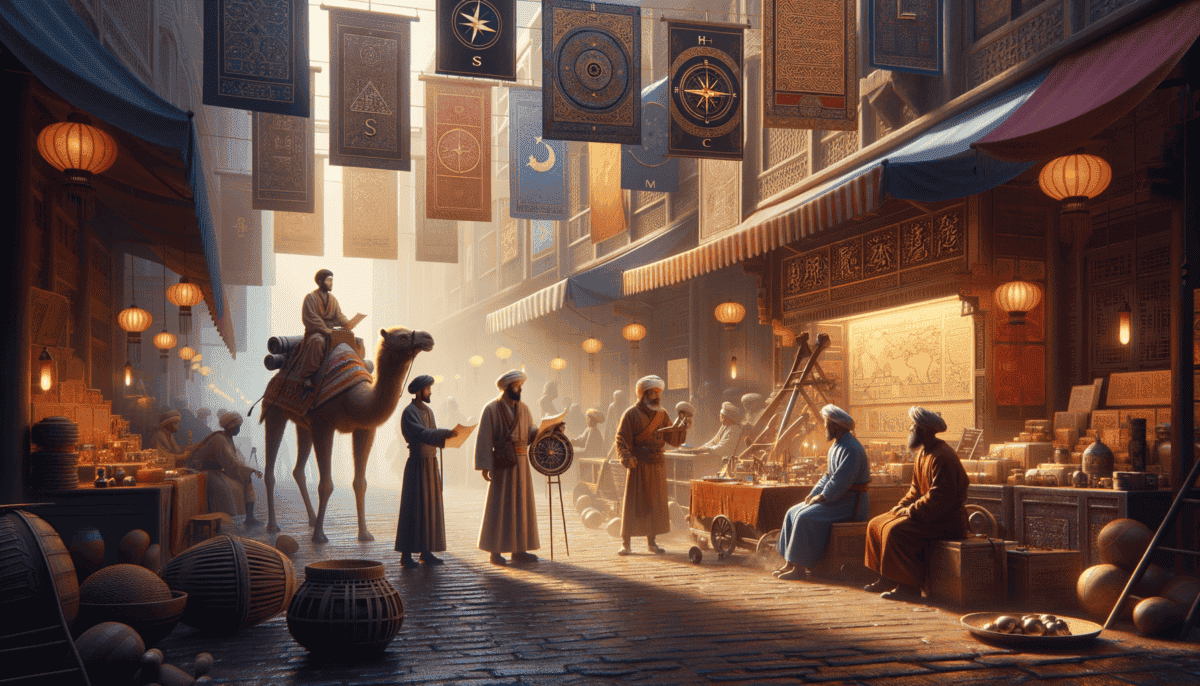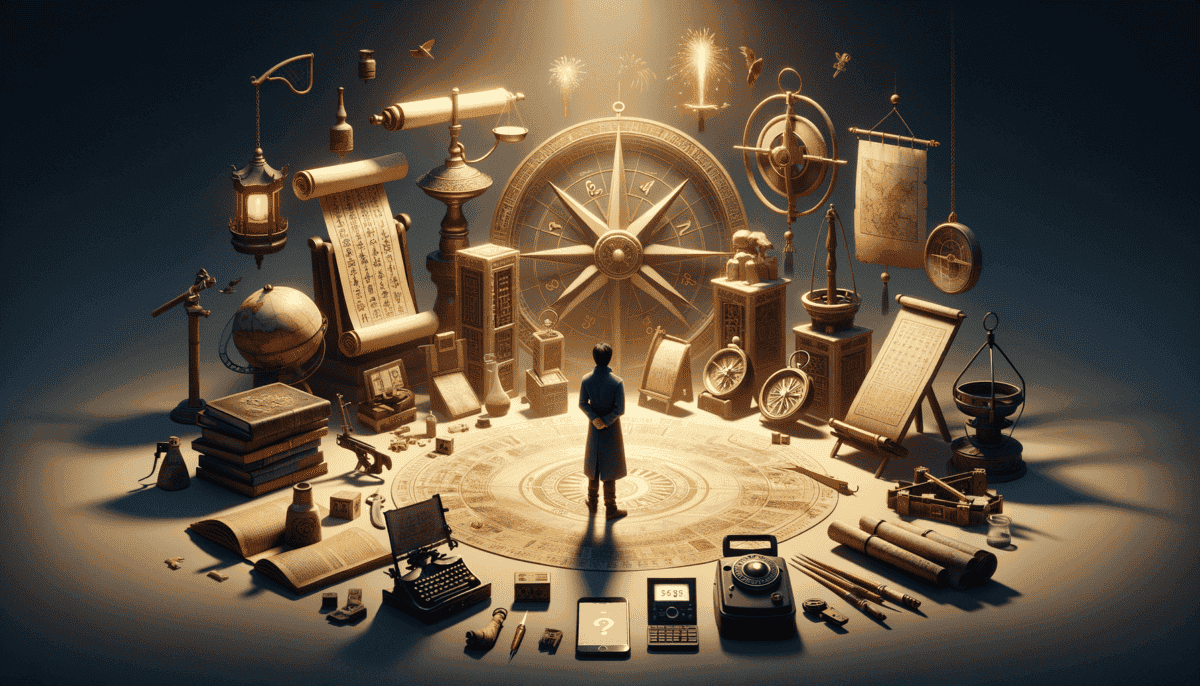A Curious Mind in the Imperial Court
The sun peeked through the tall windows of the Han Dynasty palace, where Cai Lun sat at his desk. He frowned at the heavy bamboo strips in front of him. Writing on these was hard work!
"There must be a better way," he whispered to himself, running his fingers along the rough bamboo surface. As a court official, Cai Lun spent many hours writing important messages for the Emperor.
The palace halls echoed with the sound of silk rustling and servants hurrying about. Cai Lun looked at the silk scrolls some writers used. They were smooth and nice, but too expensive for everyone to use.
"Young master," called his assistant, Ming. "What troubles you today?"
"Look at all these writing materials," Cai Lun said, spreading his arms wide. "Bamboo is too heavy. Silk costs too much. How can common people write and learn?"
Ming nodded thoughtfully. "Perhaps we could make something new?"
A bright spark lit up in Cai Lun's eyes. He jumped from his seat and grabbed Ming's arm. "That's it! We'll create something new!"
Important Discovery Box:
Cai Lun noticed these problems with old writing materials:
- Bamboo: Too heavy
- Silk: Too expensive
- Stone: Too hard to carry
For many days, Cai Lun experimented in his workshop. He tried mixing different things:
- Tree bark
- Old fishing nets
- Used cloth
- Hemp
"Master Cai Lun hasn't left his workshop in days," whispered the palace servants. But he didn't care. He was too excited about his idea.
One morning, after many failed attempts, something amazing happened. Cai Lun lifted a thin, light sheet from his wooden frame. It was smooth and perfect for writing!
"Ming! Ming! Come quickly!" he shouted with joy.
Ming rushed in and gasped. "What is this wonderful material?"
"It's paper!" Cai Lun beamed with pride. "Watch this!" He picked up his brush and wrote a beautiful character. The ink flowed smoothly across the surface.
Word spread quickly through the palace. Soon, the Emperor himself came to see Cai Lun's invention.
"This is remarkable," the Emperor said, holding a sheet of the new paper. "With this, knowledge can reach everyone in our great land."
Cai Lun bowed deeply. "That was my dream, Your Majesty. Now anyone can write and learn, not just the wealthy."
As the sun set that evening, Cai Lun watched workers hanging sheets of his new paper to dry. Each one caught the golden light like a precious treasure.
"Tomorrow," he thought, "we'll make even more. This is just the beginning." His heart felt full, knowing his invention would help people for generations to come.
That night, in his private diary, Cai Lun wrote: "Today marks the start of something wonderful. Now everyone can share their stories, their ideas, their dreams… all because of a little piece of paper."
Winds of Change – The Magnetic Discovery
The salty breeze whipped through young Ming Wei’s hair as he stood at the harbor of ancient Guangzhou. Ships bobbed gently in the water, their wooden hulls creaking softly.
“How do you find your way across the great waters?” Ming Wei asked his uncle, Captain Chen, who was preparing for another trading voyage.
Captain Chen smiled, pulling out a curious bowl filled with water. Inside floated a small iron fish on a piece of reed. “Watch this, nephew.” He moved his hand near the water, and the fish spun around!
“Magic!” Ming Wei gasped, his eyes wide with wonder.
“Not magic,” Captain Chen laughed. “This is lodestone – a special kind of rock that always points north. We call it the ‘south-pointing fish.'”
Special Note: The first compass wasn’t a needle – it was a spoon-shaped lodestone that could spin freely on a smooth surface!
Ming Wei picked up a piece of the dark, heavy stone. “But how does it work?”
“Nobody knows for sure,” his uncle replied. “But it helps us sail safely across the seas. Before this, we could only follow the stars. When clouds came…” He shook his head sadly.
That night, Ming Wei couldn’t sleep. He played with the lodestone, watching it spin and point north every time. An idea sparked in his young mind.
“Uncle! Uncle!” He burst into Captain Chen’s cabin the next morning. “What if we made the fish smaller? And put a needle through it?”
Together, they experimented. They tried different shapes and sizes until they created something new – a thin iron needle, magnetized by the lodestone, balanced perfectly on a silk thread.
| Old Way | New Way |
|---|---|
| Big floating fish | Small needle |
| Needs water bowl | Works anywhere |
“This is much better!” Captain Chen exclaimed. “We can carry it anywhere!”
Word spread quickly among the sailors. Soon, every ship wanted Ming Wei and Captain Chen’s new compass. Merchants came from far away to trade for this magical device.
“With this tiny needle,” a Persian trader said, “we can sail to new lands and meet new friends!”
Ming Wei watched proudly as his uncle’s ship set sail, knowing the new compass would guide them safely. Other ships followed, their sails bright against the blue sky.
That evening, Ming Wei sat on the dock, drawing pictures of all the places sailors might visit with their new tool. He imagined distant shores and amazing adventures, all made possible by a simple magnetic needle.
“Remember, nephew,” Captain Chen had said before leaving, “sometimes the smallest things can change the whole world.”
As the stars began to twinkle above, Ming Wei smiled. He didn’t need the stars to find his way home anymore – he had something even better. The compass would always point the way. ⭐
The Fiery Discovery
In a quiet mountain temple, Master Li bent over his workbench, his long gray beard nearly touching the colorful powders before him. The morning sun streamed through paper windows, making the dust dance like tiny stars. ✨
“Careful, young Zhang,” Master Li warned his eager apprentice. “These ingredients are very special.”
Zhang watched with wide eyes as his teacher mixed different powders in small clay bowls. They were searching for something amazing – a magic potion that would help people live forever!
Master Li’s Special Mix:
Saltpeter from cave walls
Sulfur from mountain springs
Charcoal from burned bamboo
“Master,” Zhang asked, “why do we mix these things?”
“The ancient scrolls say these powders hold the secret to eternal life,” Master Li replied, carefully stirring the mixture. “But we must be very, very careful…”
Suddenly, a spark from their cooking fire jumped onto the workbench. BOOM! The mixture exploded with a bright flash and loud noise!
“Are you okay?” Zhang coughed, waving away the smoke. His face was covered in black soot.
Master Li sat up, his eyebrows singed but his eyes sparkling with excitement. “That… was not what I expected!”
| What They Wanted | What They Got |
|---|---|
| Magic potion | Explosive powder |
| Eternal life | Powerful bang |
Over the next few days, they carefully tested their accidental discovery. They found it could:
- Make bright flashes and loud noises
- Shoot colorful sparks into the sky
- Push things with great force
- Scare away wild animals
“This is better than any magic potion!” Zhang exclaimed. “Think of all the ways we can use it!”
Soon, other temples and villages heard about their discovery. Some used it for celebrations, creating beautiful fireworks that lit up the night sky. Others found it helpful for mining, using small controlled blasts to break rocks.
“Sometimes the best discoveries happen by accident,” Master Li told Zhang as they watched their fireworks paint the evening sky with brilliant colors. “We didn’t find eternal life, but we found something just as amazing.”
Zhang nodded, his face glowing in the light of the sparkling display. “And look how happy it makes everyone!”
That night, as the last sparks faded from the sky, Zhang wrote in his journal about their discovery. He drew pictures of the colorful explosions and wrote down exactly how they mixed the powders. This new invention would change the world in ways they couldn’t even imagine.
Words That Light the Way
In a bustling workshop in the Song Dynasty, Bi Sheng’s hands moved carefully over his latest creation. The room smelled of clay and ink, and small squares covered every surface. Each square held a single Chinese character, perfectly carved.
“Look, Ming!” Bi Sheng called to his young helper. “See how these clay pieces can dance?”
One character, one block.
Move them like puzzle pieces.
Stories come alive!
Ming watched in wonder as Bi Sheng arranged the clay pieces in neat rows. “But Master,” she asked, “why not just write the words by hand?”
Bi Sheng smiled, his eyes twinkling. “Ah, but watch this magic!” He pressed the inked blocks onto paper, creating perfect copies of the same text. “Now everyone can read the same stories!”
| Old Way | New Way |
|---|---|
| Write by hand | Use movable blocks |
| One book at a time | Many books at once |
| Takes months | Takes days |
Ming helped arrange the blocks for their first big project – a book of poems. Her fingers danced over the characters, placing each one just right.
“It’s like playing with blocks,” she giggled, “but these blocks tell stories!”
As word spread about Bi Sheng’s invention, more people came to watch. A merchant named Wu arrived one morning, his eyes wide with amazement.
“This is incredible!” Wu exclaimed. “Think of all the books we could make! Stories for children, poetry for scholars, wisdom for everyone!”
Bi Sheng nodded thoughtfully. “Knowledge shouldn’t be just for the rich. With these blocks, we can make books for all who want to learn.”
The Magic of Printing:
Fast, clear, and perfect copies every time!
Share stories with everyone!
Make learning easier for all!
One day, Ming discovered something exciting. “Master, look!” She showed how arranging the blocks in different ways could create new stories. “It’s like having endless words at our fingertips!”
Together, they printed their first collection of children’s stories. The illustrations were beautiful, and the words were crisp and clear. When they handed out the books, children’s eyes lit up with joy.
“Now everyone can read the same stories I read,” one little girl said, hugging her book close.
Bi Sheng watched as more and more people came to learn about printing. He taught them how to make the blocks, arrange them, and create beautiful books. Each day, more stories spread throughout China.
“You see, Ming,” he said one evening as they cleaned their workshop, “these little blocks are like seeds. They plant knowledge in people’s minds and help wisdom grow everywhere.”
Ming smiled, carefully placing each block in its proper spot. She knew they were part of something special – something that would change how people learned and shared stories forever. ✨
The Silk Road’s Story Spreaders
Li Wei adjusted the heavy pack on his camel as dawn painted the sky pink. His caravan was ready to leave Xi’an, loaded with precious cargo – not just silk and spices, but something even more valuable: knowledge.
The desert winds whisper,
Carrying secrets so far,
Paper turns to gold.
“Father, tell me again what we’re carrying!” young Mei tugged at Li Wei’s sleeve. It was her first journey on the Silk Road.
Li Wei pulled out a carefully wrapped package. “See these? They’re blocks for printing, like the ones Bi Sheng made. And here’s paper from our finest makers. In my other bag, I have a special compass to guide us through the desert.”
Special Treasures in Li Wei’s Pack:
• Printing blocks for making books
• Soft, strong paper
• Magnetic compass
• Secret gunpowder formula
The caravan moved through bustling markets and quiet deserts. At each stop, merchants and scholars gathered around Li Wei, amazed by the Chinese inventions.
“Watch this,” Li Wei demonstrated in a Persian marketplace. He placed a compass on a flat surface, and gasps filled the air as the needle spun to point north.
A Persian merchant named Hassan clapped his hands. “This will change everything! No more getting lost in the desert!”
Mei helped show how the printing blocks worked. “See? Just like stamping! Now you can make many books quickly.”
| Place | What They Loved Most |
|---|---|
| Persia | The Compass |
| India | Paper Making |
| Arabia | Printing |
In India, a wise teacher named Arun was fascinated by the paper. “It’s so light, yet strong! Much better than heavy palm leaves for writing.”
“Here’s how we make it,” Mei explained proudly. “We use old clothes and tree bark, mash them up, and press them flat!”
Each place they visited, people added their own ideas. Arabian scholars found new ways to use the compass. Indian artists created beautiful designs with the printing blocks.
“Look, Father!” Mei pointed to a group of children reading a printed story. “Our inventions are making people happy everywhere!”
Li Wei smiled. “Yes, little one. Ideas are like birds – they need to fly free to make the world better.”
At night, around campfires, travelers shared stories of how these inventions changed their lives. A sailor told how the compass helped him find new lands. A teacher spoke of how printed books helped more children learn.
“The world feels smaller now,” Hassan said one evening. “These inventions connect us all.” ⭐
As their journey continued, Mei kept a special diary. She wrote about all the new friends they made and how China’s inventions brought smiles to faces everywhere.
“Father,” she whispered one night under the stars, “we’re not just traders. We’re story spreaders!”
A Legacy That Lives On
The morning sun peeked through Professor Chen’s classroom window as she held up an ancient piece of paper. Her students leaned forward, eyes wide with wonder.
“Can you believe,” she said with a smile, “that this paper is over 1,000 years old? Just like the kind Cai Lun first made!”
Old wisdom whispers still,
Through time’s endless pages,
Teaching us today.
Little Ming raised his hand excitedly. “My mom says she uses paper every day at her printing company! Just like Bi Sheng’s invention!”
How Ancient Inventions Help Us Today:
• Phones use special compasses
• Books are printed super fast
• Paper is everywhere
• Fireworks bring joy
“That’s right!” Professor Chen beamed. “And guess what? Your phone’s GPS works a lot like those first compasses that helped brave sailors find their way.”
She pulled out her phone, showing the class how the digital compass worked. “Technology changes, but the clever ideas of our ancestors still guide us.”
“Even my video games?” asked Li Jun, bouncing in his seat.
“Even those! The gunpowder that makes fireworks so beautiful helped us understand how things go boom – which led to rockets and space travel!”
| Ancient Invention | Modern Use |
|---|---|
| Paper | Books, Art, Money |
| Compass | GPS, Navigation |
| Printing | Digital Printers, Books |
The children gathered around a 3D printer humming in the corner. “This is like Bi Sheng’s printing blocks,” Professor Chen explained, “but instead of words, it can print toys!”
She picked up a compass app on her tablet. “And look – sailors still use compasses, but now they’re in phones and big ships!” ⛴️
“My grandpa says these inventions made the world smaller,” shared Mei Ling.
“He’s right! Just like merchants on the Silk Road shared these discoveries, we share ideas through the internet today. The world keeps getting more connected!”
Professor Chen opened her desk drawer and pulled out four special items: a sheet of handmade paper, a traditional compass, a small printing block, and a picture of fireworks.
“These four inventions changed everything,” she said softly. “They helped people learn, explore, share stories, and celebrate. And they’re still helping us today!”
The bell rang, but nobody moved. They were too busy imagining all the new inventions they might create someday.
“Remember,” Professor Chen said as her students finally gathered their things, “every big idea starts with a curious mind and a brave heart – just like those ancient inventors. Maybe one of you will create the next great invention!”
As the children filed out, their eyes sparkled with possibilities. After all, every amazing discovery – from paper to smartphones – began with someone asking, “What if?”
And somewhere, in labs and classrooms around the world, new inventors were still building on those ancient dreams, reaching for tomorrow’s stars with tools forged in yesterday’s wisdom.


